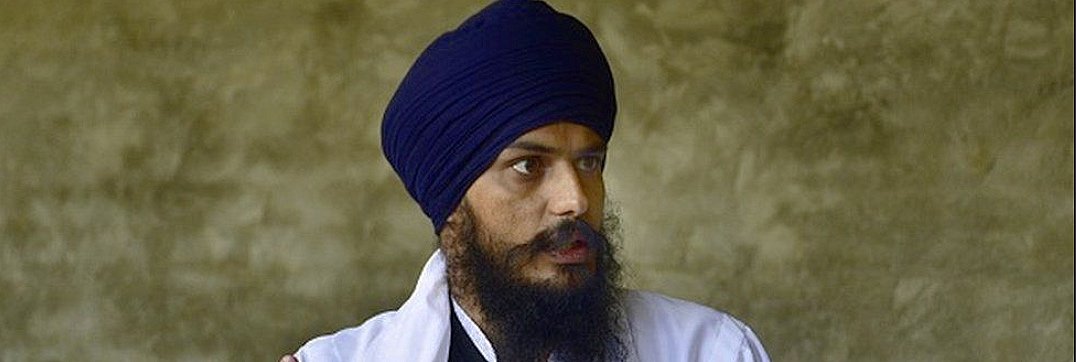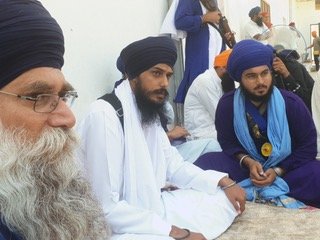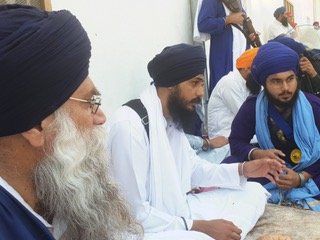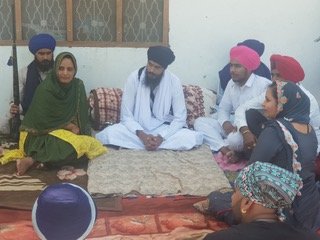Amritpal Singh: A Rebel Seeking a Separate Country for Sikhs In Drug-Plagued Punjab State
Amritpal Singh, Punjab’s self-styled chief of “Waris Punjab De” (Heirs Of Punjab).
PUNJAB, India — Until just last year, Amritpal Singh was a truck driver in Dubai who suddenly showed up in the Indian state of Punjab and declared himself the self-styled chief of “Waris Punjab De” (Heirs Of Punjab). Since then, Singh has been vocally advocating for “Khalistan” or a separate country for Sikhs, fronting his separatist urge with a campaign against rampant drug addiction in Punjab.
While most of his associates have been arrested after security agencies started a search on March 18, the 30-year-old radical separatist leader is on the run.
An operation was launched against the pro-Khalistan leader days after his followers — who were armed with sticks, rifles and swords — broke a police barricade and forced their entry into a police station at Ajnala in Punjab seeking the release of their arrested aide, Lovepreet Singh Toofan.
Police arrested Toofan on charges of kidnapping and assault and released Toofan the next day. As visuals splashed on the TV screens of Amritpal’s followers clashing with the police shocked India, Amritpal Singh came into sharper focus for citizens in Punjab.
Who is Amritpal Singh?
Amritpal Singh was born in Jullupur Khera in the Amritsar district of Punjab. He reportedly enrolled himself in a polytechnic college before moving to Dubai to join a transport business in 2012. In 2022 he returned to India to take over the leadership of Heirs of Punjab after founder Deep Sidhu died on Feb. 15, 2022, in a road accident.
“I am not saying that there is no law and I am the law,” Amritpal said in an interview with ReligionUnplugged.com. “I believe there is a government. But I also expect them to behave like a government. Are they behaving like a government? Is justice served to anybody? They promised to end this drug epidemic in a week or 24 hours or in a month. It has been a year since the government came to power in Punjab, but the problem has remained unresolved.”
Amritpal, who has taken the role of a religious preacher, hasn’t been a devout Sikh in the past. While he is on the run, old photos of Amritpal with cut hair and a trimmed beard have surfaced on social media — personal grooming practices that are not in line with the tenets of Sikhism.
Surrounded by armed followers in a “gurudwara,” a Sikh place of worship, in his native village of Jallupura Khera in Punjab, he has modeled himself on Jarnial Singh Bhindrawle.
Bhindrawle, who led the Khalistan movement or the demand for a separate country for Sikhs, was killed with his supporters in a military operation by India at the Golden Temple in Amrtisar in 1984. The Golden Temple in Amritsar is the center of the Sikh faith. Every day, thousands of devotees from across the world visit the Golden Temple.
The official casualty figures for the army in Operation Blue Star were 83 dead and 249 injured. A total of 554 militant and civilian casualties were also reported in the operation that lasted for 10 days.
“I don’t claim to be Bhindrawale 2.0,” Amritpal said in an interview with ReligionUnplugged.com. “Bhindrawale was a saint. I am not a saint. He had very deep religious teaching. I would say that Bhindrawale is an inspiration for every Sikh.
“Seeking Khalistan is totally democratic. Tell me any democracy opposing such a thing. Even Khalistan is not my main idea; I am fighting against drug addiction. I am talking about ‘Sikhi,’ and ‘Raj Karega Khalsa’ is so embedded in Sikhi. Raj means sovereign rule. We had a history of sovereign rule. Seeking that ‘Raj’ back in a peaceful manner is not a crime.”
The Khalistan movement
The Khalistan movement seeks to establish a sovereign state for Sikhs. This separatist movement peaked in the 1970s and ’80s with the support from Sikh Diaspora.
In the ’90s, the calls for a separate homeland for Sikhs petered out due to successful operations against separatists by the security forces and a general sense of disillusionment among the population.
“They can kill me, and I think many people will be happy to see that,” Amritpal said. “They were happy about the Blue Star operation. We had an insurgency period; we saw so much suffering during that period. If you think we still have to face more consequences, we are ready for that — what is left?”
Security analysts say government forces have a complete grip over the situation: Even as there may be minimal support for Khalistan in some pockets of Punjab, this can never transform into a full-fledged movement, and Amritpal can never become Bhindrawale 2.0.
“Let me tell you, Bhindrawale still is an iconic figure in parts of Punjab,” Former Punjab Director General of Police Shahsikant said. “Lots of people swear by him, and if he tries to take his place, then I am sure, he will face the consequences because in certain pockets, Bhindrawale is a cult figure in Punjab.
“But yes, whatever he is saying time and again, I don’t know who is propping him. Everybody knows that he went to Dubai. His family had moved out in the mid-’90s. Some say he was in Canada and from Canada he went there. There is a hazy picture; nobody knows from where he just propped up.'“
Punjab’s drug problem
Terrorism has mostly ebbed in Punjab, but the scourge of drug addiction is only on the rise. Punjab has the dubious distinction of being one of the worst affected states in India, with a large section of its population falling prey to substance abuse.
The state's proximity with Pakistan has not helped either. With traditional routes getting blocked, smugglers are now using newer methods like drones to transport drugs across the border. In the past, all the political parties promised to wage a war against the menace of drug addiction.
The problem was the major policy promise of the Aam Aadmi Party, led by its chief ministerial candidate, Bhagwant Mann. The party swept the assembly polls in 2022, beating traditional rivals like the Congress and the BJP. But after more than a year in power, most people say there is no significant change on the ground to make the state drug free. And it is precisely this sentiment that Amritpal is cashing in on. It is also a strategy to reach out to the population and increase its support base. Amritpal says the gurudwara at his village also functions as a rehabilitation center.
He says that most of the workers at the gurudwara were initially drug addicts who have now been rehabilitated after spending time there and doing mediation courses.
“I am very successful when it comes to curbing drug addiction,” Amritpal said. “People coming here are leaving drugs without any medicine, without any synthetic alternative drugs, and their families are happy about it. They have hope.
“Without any backing from the government or any institution, we are fighting against drugs and drug lords, who are distributing drugs. It is a $1 billion industry that we are fighting against.”
According to a study by Post Graduate Institute of Medical Education and Research, in 2022, over 3 million people in Punjab were consuming drugs. This is around 15.4% of the state’s population. Alcohol tops the list of maximally abused substances. Over 2 million people consume alcohol in Punjab.
Ravinder Singh and Sarapjit Singh — whose names have been changed — were addicted for years but totally gave up substance abuse after enrolling at the gurudwara. The two friends say this was possible only under the mentorship of Amritpal.
They have now taken on the roles of running the community kitchen or the “langar” of the gurudwara and help in security arrangements.
“I returned to India from Melbourne in 2015 and got married in 2016, got into drugs from 2017 until last month,” Ravinder Singh said. “I heard about this place. While other centers demand money, they (the gurudwara) did not take any money. The best thing about this place is that they don’t use medications. I came here to get rid of drug addiction and to become a better human being. I have got two daughters. If I am not OK, my family is (not) going to be OK as well.
“Breaking away from drugs for 72 hours is the first step toward de-addiction. Some can’t bear that pain and are administered medicine. When I came here I didn’t take any medicine, I felt a lot of pain, but the thought we have to fight and win this war kept me going. My family is happy that I finally got rid of drug addiction.”
Other factors responsible for Amritpal’s rise
But is a fight against drug addiction the only reason for Amritpal’s rise? Political analysts disagree. They say a major disconnect between the state’s political class and its people has mainly helped to strengthen his support.
“Actually the reason for Amritpal’s rise is that … the political leadership of Punjab cutting across political lines has become diluted,” said Narinderpal Singh, a journalist and a political commentator.
“The first tier of leadership is totally diluted, and people don’t trust them. The second tier is destabilized. They don’t know where to go and keep changing parties. They do nothing for people and live for themselves only. The issues of people remain unresolved. The youth wings of parties cannot take independent decisions. This has caused resentment and from that resentment Amritpal has risen.”
But the question some ask is — despite Amritpal clearly taking a separatist stand for some time now — why have law enforcement agencies taken no action against Amritpal? Can a long rope offered to Amrtipal push the state toward violence?
“It is surprising that till now, no action was taken by the government against Amritpal,” said former Director General of Police Shashikant. “He might ask for Khalistan, but rest assured that this demand is not going to cut any ice in Punjab because people have suffered in the past, and they know the price they paid whatever their religion was and whatever community they belonged to.”
Editor’s note: Funding to ReligionUnplugged.com from Google’s News Equity project helped sponsor this story.
Zaffar Iqbal is a journalist based in Kashmir, India. He has reported for 18 years on armed encounters, environmental issues, crime, politics, culture and human rights. He’s formerly the bureau chief of Jammu-Kashmir for NDTV.





